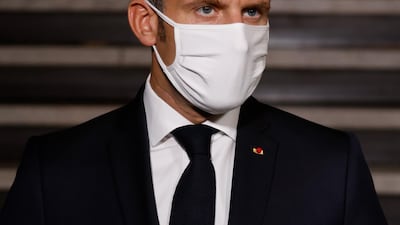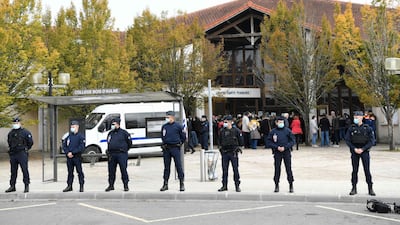France has banned a pro-Hamas group active in the country after it was accused of being directly implicated in the beheading of schoolteacher Samuel Paty in Paris last week, as French authorities intensified their actions against alleged extremists.
President Emmanuel Macron said the Cheikh Yassine Collective, named after the founder of Hamas, would be prohibited from Wednesday. A Paris mosque that shared a denunciation of Mr Paty will also be closed.
Mr Paty was murdered by 18-year-old Chechen refugee Abdulakh Anzorov after the schoolteacher showed caricatures of the Prophet Mohammed in a class discussion about freedom of expression. Anzorov was later shot dead by police.
"This is not about making more statements," Mr Macron said during a visit to a Paris suburb. "Our fellow citizens expect actions. These actions will be stepped up."
He said he wanted to see “tangible results” to combat “an ideology of destruction of the (French) Republic”.
Prime Minister Jean Castex said on Tuesday that authorities were targeting “all associations whose complicity with radical Islamism has been established”.
French police believe that at least one pupil was paid by the killer to identify his target.
Anti-terrorism and intelligence investigators have reportedly discovered that Anzorov received hundreds of euros from an unidentified source to help him pay pupils to identify the teacher.
One boy of 15, among four pupils detained for questioning, has admitted receiving money for pointing Mr Paty out. It is not clear what, if anything, the killer told him about his intentions.
The Cheikh Yassine Collective was set up by Abdelhakim Sefrioui, who has been arrested as part of the investigation into the attack.
Interior Minister Gerald Darmanin said Sefrioui had helped spread a virulent message against Mr Paty before the beheading. The teacher had been subject to widespread hate online for showing the caricatures.
Hamas said it had no links to, or organisational relationship with, Sefrioui or his group.
A disgruntled parent who had stirred anger about Mr Paty's lesson through messages on social media had communicated on WhatsApp with Anzorov in the days leading up to the murder.
The material he uploaded was widely shared, including by a mosque in the northern Paris suburb of Pantin, which is being closed for six months from Wednesday night.
A sign posted by the regional prefecture at the mosque entrance said the place of worship would be shut, with a six-month prison sentence for violators.
Prosecutor Jean-Francois Ricard said a 14-year-old and a 15-year-old are among seven people initially detained for questioning who appeared before an investigating magistrate today on accusations of "complicity in murder in relation with a terrorist undertaking" and "criminal conspiracy."
“The investigation has established that the perpetrator knew the name of the teacher, the name of the school and its address, yet he did not have the means to identify him,” the prosecutor said. “That identification has only been possible with the help of students from the same school.”
“That’s why the anti-terrorism prosecutor’s office has decided to prosecute two under-18 minors whose implication in the identification of the victim for the killer has appeared to be conclusive,” he said.
The other suspects also include a student’s father who posted videos on social media that called for mobilisation against the teacher and an Islamist activist who helped the man disseminate the virulent messages, which named Paty and gave the school’s address, Mr Ricard said.
Two more men, aged 18 and 19, are accused of having helped the attacker by accompanying him when he bought the weapons, including a knife and an airsoft gun, that were found near the 18-year-old’s body, according to the prosecutor. One of them allegedly drove Anzorov 90 kilometres from the Normandy town of Evreux to near the school about three hours before the killing.
Another 18-year-old suspect had close contacts with the attacker and endorsed radical Islamism, Mr Ricard said.
Al three, who were friends of Anzorov, allegedly said that “he was ‘radicalising’ for several months, marked by a change of behaviour, physical appearance, isolation, an assiduous frequentation of the mosque and ambiguous remarks about Jihad and the Islamic State group”.
On Wednesday evening, Mr Macron will attend an official memorial with Mr Paty's family and some 400 guests at the Sorbonne university, posthumously giving the teacher France's highest award, the Legion d'Honneur.
More than a thousand people gathered on Tuesday at the place where Mr Paty was murdered as he left school in the northwest of Paris.
Mr Paty's beheading was the second knife attack claimed in the name of avenging Prophet Mohammed since a trial started last month over the Charlie Hebdo killings in 2015, when 12 people were gunned down for publishing cartoons of the Prophet.
Mr Macron has made sweeping proposals for combating extremism in French society, which will be presented to his cabinet in December.
With his presidential term ending in 2022, he sees a need to counter claims by his main rival, the far-right Marine le Pen, that his responses to terrorism and Islamism in society are inadequate.
Doubts had been expressed about his ability to win a parliamentary majority for his anti-Islamism measures.












